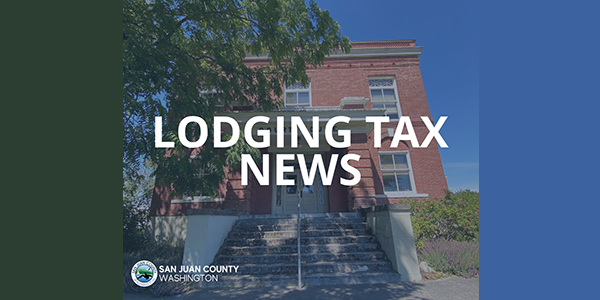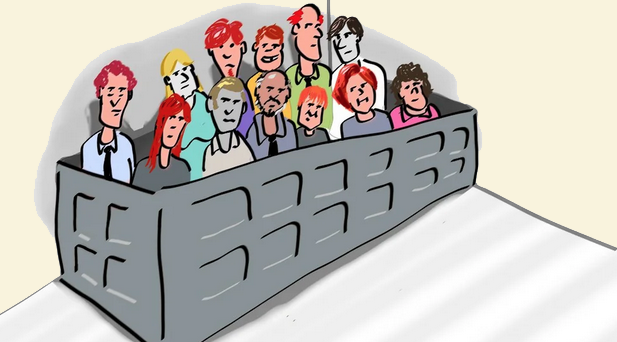||| FROM SAN JUAN COUNTY COMMUNICATIONS |||
To kick off the new year, San Juan County is pleased to announce funding from the Lodging Tax Advisory Committee (LTAC) to local organizations, non-profits, County departments, and exciting new events. This year, core funding was awarded to 11 entities and additional funds were allocated to 25 special projects throughout the islands totaling approximately $1.9 million.
Where do Lodging Tax funds come from?
Funded by a portion of the revenue collected under the State Lodging Tax excise statutes, this program is made possible in part by the many local hotels, bed and breakfasts, and other lodgings that collect taxes from visitors. Collected funds support activities, programs, and capital projects related to tourism events, infrastructure, and services.
Where does the money go?
Lodging Tax dollars provide core funding to chambers, museums, and theaters on San Juan, Orcas, and Lopez Islands, the County Fair, and the Visitors Bureau. During the December 23, 2024 Council meeting, the Council approved a one-year contract with the San Juan Islands Visitors Bureau with a flat fee of $535k, which represented an 8% decrease in funding to that entity from previous years.
The Council also awarded Lodging Tax funds for special projects to the following entities – some of which received awards for multiple projects:
- Alchemy Art Center to grow Alchemy’s off-island attendance and bring more arts-centered visitors to the islands year-round.
- The Lopez Original Theater to host playwrighting workshops, the Annual Original Works Festival, and more.
- Lopez Island’s First Saturday Art Walk to grow the scope and impact of the event with possible public art installations and musical performances, a dedicated youth space, and an Artist in Residence Program.
- Mentors to Mentors Environmental Education program to provide opportunities for underrepresented, high poverty youth to access an experiential, recreational, and service-learning environment.
- The Orcas Center to support the 2025 Summer Concert Series as well as technology updates for the theater.
- The Orcas Chamber for website updates that prioritize an easier user experience.
- The Orcas Island Farmers Market to improve the entertainment offerings for the summer markets and add offerings to the fall Saturday markets.
- The Orcas Island and Friday Harbor Film Festivals for marketing efforts and operational costs.
- The Orcas Island Historical Society to support the Orcas Island Cider & Mead Festival that celebrates the heritage craft of cider and mead making.
- The San Juan Community Theater for building improvements such as paint, siding, and roof repairs.
- The San Juan Historical Museum to add an exhibit detailing the significance of fish canneries within the Museum of History and Industry.
- The Ag Guild and Conservation District to create economic opportunities for local ag producers, retailers, and organizations by promoting agritourism events year-round in the San Juan islands.
- Department of Environmental Stewardship to update content in the Stewardship Guide and print and distribute guide booklets to accommodations, businesses, and vacation rentals, and more.
- The Parks, Recreation, and Fair Department to purchase replacement equipment such as mowers, tents for the Fairgrounds, pipe and drape for exhibit displays, and more.
- The Public Works Department to construct a new sidewalk along Pear Point Road to connect the Argyle Ave sidewalk to Jacksons Beach Road and provide safer pedestrian access to the beach, boat launch, and gathering spaces.
- The SJI Agricultural Summit to support the regional marketing campaign, program printing, and venue expenses for the 2025 Summit.
- The San Juan Island Museum of Art (SJIMA) to design and deliver a focused print and digital campaign to promote its 20th anniversary and San Juan Island as a fall and winter destination for arts and culture enthusiasts.
- The Conservation District to host trail maintenance/community outreach events on Lopez, Orcas, and San Juan Islands during the Youth Conservation Corp. 2025 summer season.
- The San Juan Islands Makers Guild and Heritage Ranch to support advertising and managing programs that host fairs, festivals, and workshops including the Salish Sea Folk Arts Festival, Earth Day Orcas, and all islands Winter Artisan Markets.
These activities and more are expected to increase economic activity in San Juan County in 2025 and beyond through the overnight lodging of tourists, through tourism-related expenditures, and construction of tourism-related facilities.
For information about the Lodging Tax Advisory Committee, visit the County’s website at: https://www.sanjuancountywa.
For questions, contact Aiden Haines at the office of County Council (360) 370-7473 or aidenh@sanjuancountywa.gov.
**If you are reading theOrcasonian for free, thank your fellow islanders. If you would like to support theOrcasonian CLICK HERE to set your modestly-priced, voluntary subscription. Otherwise, no worries; we’re happy to share with you.**









It is beyond absurd that the state prohibits the Lodging Tax from being used to fund affordable housing. Our new council needs to put pressure on our state legislators to change the limitation. This is low hanging affordable housing fruit. The roots of affordable housing problems are systemic and beyond our reach from San Juan county but there are plenty of mitigation opportunities and adjusting the Lodging Tax to allow it’s use for affordable housing projects seems like an obvious step.
Mr. WOOD. “The roots of affordable housing problems are systemic and beyond our reach”. Did you really say that with a straight face? You are a short term vacation rental owner/operator.
So basically they tax the tourists, then turn around and give most of the money to the Visitors Bureau and organizations that serve as tourist magnets.
These organizations market the islands to tourists, with an increasing push for “year round” tourism, and upgrade their facilities and operations to attract and accommodate larger numbers of tourists.
This brings more tourists to the islands, which generates more lodging taxes, which generates more funding for marketing and facilities upgrades, and this cycle goes on year after year, as those of us with no stake in the tourist industry whatsoever are asked to accommodate the increasingly negative impacts.
Does anyone else see the problem with this? The county is funding a damaging pro-growth industry with clear negative impacts on the islands, and because our property and sales taxes continue to rise, all taxpayers in the county are subsidizing this industry but most of the money ends up in private hands.
It’s bizarre that taxpayers who don’t have a financial stake in the tourist industry are financially supporting the lifestyles of people who can’t figure out how to make a living on these islands without pandering to hordes of wealthy tourists.
Although a few of the grants on the list have a clear benefit for locals, read between the lines and look at where the tax dollars are going. Instead of helping solve local problems and funding climate mitigation projects, the county wants more people driving, ferrying, and flying out here to spend money.
…grow off-island attendance and bring more arts-centered visitors to the islands year-round.
…improve the entertainment offerings
…for marketing efforts and operational costs.
…promoting agritourism events year-round
…support the regional marketing campaign
…promote San Juan Island as a fall and winter destination for arts and culture enthusiasts.
…support advertising and managing programs
RR Davis – Ad hominem attacks are the sign of a weak mind and a weak argument.
Yes, I am the owner/operator/groundskeeper/housekeeper and maintenance man of a vacation rental. That is how I support myself in my working-retirement. Where does YOUR money come from? I came to Orcas 35 years ago, built a home and raised my children here. I worked in construction and real estate and now my wife and I have two small vacation rentals. Does that history somehow diminish my right to speak my mind?
Any rational person can see that doubling the national population and outrageous income disparity are the primary causes of a lack of affordable housing. Both are deep rooted, global issues endemic to Western Civilization and are absolutely beyond our capacity to change. Local mitigation is the best that can be hoped for. Unfortunately the state limitations on county use of Lodging Tax revenue prevent using those funds for affordable housing projects. Getting those state rules changed should be a priority for the new council.
RR Davis – When you have something positive to contribute to the conversation I am willing to listen, until then I suggest you think before you post.
The lodging tax revenue is supposed to be used to “support activities, programs, and capital projects related to tourism events, infrastructure, and services”. Events, infrastructure and services require people (workers) who live here to service those activities, programs and capital projects. People require housing. Some lawyer somewhere should be able to connect the dots & find legal justification for using lodging tax money for affordable housing.
The alternatives are to restrict those supportive workers to the pool of people who already own their own homes and want to work in those jobs — or for those industries to pay the high wages that would permit those workers to pay the high rents or buy the expensive homes that are now unaffordable for workers. Either of those unlikely alternatives would make tourism-dependent businesses less profitable. Or we can continue to use the lodging tax to fund programs that actually make life harder for those at the bottom of the economic ladder, which is in the long run, IMO, self-defeating, unsustainable, and without conscience.
Summer tourism ala 2019 here is unmanageable, has clear negative socio-environmental impacts (externalities) that are paid by residents and requires generally minimum wage workers who by necessity rely on residents and local taxes and donations to make ends meet. These are facts. It is called a “wicked problem” worldwide for good reason.
The very expensive County contracted Destination Management Plan, long overdue but entirely unhelpful in terms of actionable solutions, was dead upon arrival at the County Council primarily due to the backlash of locals outraged that most potential ” fixes” involved taxes or permits for locals in order to further study the problem or seasonally making roads one way as on the westside of SJI. State and Federal constitutional constraints make local residents and tourists fully equal. This is not a black mark on planners or even consultants, it is blinding flash of the obvious.
Astoundingly, summer tourism as our second largest economic sector has never been thoroughly examined in a Comp Plan process until now. Jump in!
The above statements are excellent. Cogent and accurate and should be analyzed in the current effort. It will be a while before a more diversified economy can be created and the importance and impacts of summer over-tourism reduced by funding and accentuating sustainable businesses and activities that pay a living wage. This mess has been nurtured by the powers that be for over 50 years.
By the way RR Davis vacation rentals are now limited and regulated with enforced permit requirements that greatly reduce the free for all of just a couple of years ago. Those who participate legally and conscientiously with respect for neighbors and actually live here are to be respected IMO.
As RR Davis correctly infers, one of the root causes of SJC’s housing crisis is the proliferation of vacation rentals.
He’s simply pointing out his incredulity of the statement that you made (Ken) when you said, “The roots of affordable housing problems are systemic and beyond our reach,” when clearly there’s a cause and effect, and there are those, who by choice, sit closer to the actual root of the problem than others. When it comes to money it’s easy to rationalize our behaviour, and to disassociate ourselves from the problem. I know people who work for one of our local affordable housing nonprofits at the same time they operate vacation rentals themselves. I know another who’s a local micro-lender who lends to people who’ve invested that money in vacation rentals, and who while sitting on the board of the same non-profit rents out a vacation rental himself. His observation that you sit closer to the problem than most is neither weak-minded, negative or the sign of a weak argument… it’s just a fact.
All said, I agree that using some of the lodging tax proceeds to help fund affordable housing seems logical, and would perhaps be a better use of these funds… perhaps taking from the funding that is currently put into the operation of the Visitors Bureau and and the Chambers of Commerce promotional arm would be a good way to do so, and would help offset the damage that these entities are doing to our communities. Though we should be conscious of, and I might caution us lest the new direction of funding then becomes part of the debate allowing that since tourism pays for itself then by logic more tourism must be good. Short-term thinking would allow that more tourists equal more lodging tax proceeds equals more affordable housing, and though this sounds good in principle, if misapplied, this would also be opening a Pandora’s box. Considering that this is 2025, and we live in a world ruled by climate change, we’re learning that more is not better. And where money has never been the bottom line for the many of us that moved here to get away from this type of sensibility, this takes on more the appearance of something resembling a quick fix to what is really a long term problem. In fact, one could argue whether it would ultimately be a positive form of mitigation at all when, in essence, it would actually be increasing and perpetuating the very problems that it helped create.
Steve, you said, “By the way RR Davis vacation rentals are now limited and regulated with enforced permit requirements that greatly reduce the free for all of just a couple of years ago.”
In a perfect world maybe. SJC is not known for it’s enforcement. It’s known instead, (and by it’s own recognition), as an enabler. Vacation rental limits were both to late and to little in coming. Also, RR lives in one of the Master Planned Resort areas that are exempt from the new limits, and his home is surrounded by vacation rentals operated by off-island landowners. This has had negative impacts on him, his family, and the area in which he lives. He is not alone.
The kicker is that we could lose the vacation rental limits at any time with a majority vote of the county council. Indeed, we heard a slew of less than encouraging responses from each of the incoming council members during their campaigns when they were asked about their views regarding the limits on vacation rentals… with the public only hearing muted variations of, “I don’t see the need to do anything about the vacation rental limits at this time,” or, “There’s no need to visit the issue of caps until the vacation rental limit review period comes around.” The writing is on the wall.
Absurdity is pursuing short term quick fixes in an effort to alleviate long-term problems. Though using the Lodging Tax to fund affordable housing sounds good in philosophy, it is, in essence, simply putting a spin on the cause and effect of that which helped kill our affordable rental and affordable housing markets in the first place, (this being our tourism-based economy), thus having a mitigating effect perhaps only on the debate surrounding the issue… and not on the issue itself. In other words, some see this not as a problem of simply not having enough money to build more affordable housing, but one of pursuing failed economic policies that in themselves promotes their demise. Fixing one without fixing the other is not a long-term solution.
Steve, you also said, ” Those who participate legally and conscientiously with respect for neighbors and actually live here are to be respected IMO.” This goes without saying, and you’d be hard pressed to find anyone who would disagree with that. When I served on the board of the Orcas-based Vacation Rental Working Group we analyzed the vacation rental issue from every angle. We talked to impacted residents, we looked at the numbers of vacation rentals in SJC and analyzed the negative impacts that they were having, and we also rated different the types of vacation rentals according to the positive and negative impacts that they had on their neighbors and on our communities. There were many variables considered in our system of evaluation, but perhaps the strongest points boiled down to the good ones being the single unit operators with local owners who lived on the property (you know, the mom and pop types that exhibited the persona that Airbnb originally hosted). And with the worst ones being the multiple unit operators who lived off-island (investors).